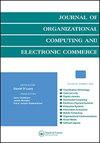Small Clues Tell: a Collaborative Expansion Approach for Effective Content-Based Recommendations
IF 1.9
4区 管理学
Q3 COMPUTER SCIENCE, INFORMATION SYSTEMS
Journal of Organizational Computing and Electronic Commerce
Pub Date : 2020-02-15
DOI:10.1080/10919392.2020.1718056
引用次数: 7
Abstract
ABSTRACT Content-based recommendation techniques usually require a large number of training examples for model construction, which however may not always be available in many real-world scenarios. To address the training data availability constraint common to the content-based approach, we develop a collaborative expansion-based approach to expand the size of training examples, which could lead to improved content-based recommendations. We use a book rating data set collected from Amazon to evaluate our proposed method and compare its performance against those of two salient benchmark techniques. The results show that our method outperforms the benchmark techniques consistently and significantly. Our method expands the size of training examples for a focal customer by leveraging the available preferences of his or her referent group, and thereby better supports personalized recommendations than existing techniques that solely follow content-based or collaborative filtering, without incurring costs to identify, collect, and analyze additional information. This study reveals the value and feasibility of collaborative expansion as a viable means to increase training size for the focal customer and thus address the training data availability constraint that seriously hinders the performance of content-based recommender systems.小线索告诉:有效的基于内容的推荐的协作扩展方法
基于内容的推荐技术通常需要大量的训练样例来构建模型,然而在许多现实场景中并不总是可用的。为了解决基于内容的方法常见的训练数据可用性约束,我们开发了一种基于协作扩展的方法来扩展训练示例的大小,这可能导致改进的基于内容的推荐。我们使用从Amazon收集的图书评级数据集来评估我们提出的方法,并将其性能与两种显著的基准测试技术进行比较。结果表明,我们的方法持续且显著地优于基准测试技术。我们的方法通过利用他或她的参考群体的可用偏好来扩展焦点客户的训练示例的大小,因此比现有的仅遵循基于内容或协作过滤的技术更好地支持个性化推荐,而不会产生识别、收集和分析额外信息的成本。本研究揭示了协作扩展作为增加焦点客户训练规模的可行手段的价值和可行性,从而解决了严重阻碍基于内容的推荐系统性能的训练数据可用性约束。
本文章由计算机程序翻译,如有差异,请以英文原文为准。
求助全文
约1分钟内获得全文
求助全文
来源期刊

Journal of Organizational Computing and Electronic Commerce
工程技术-计算机:跨学科应用
CiteScore
5.80
自引率
17.20%
发文量
7
审稿时长
>12 weeks
期刊介绍:
The aim of the Journal of Organizational Computing and Electronic Commerce (JOCEC) is to publish quality, fresh, and innovative work that will make a difference for future research and practice rather than focusing on well-established research areas.
JOCEC publishes original research that explores the relationships between computer/communication technology and the design, operations, and performance of organizations. This includes implications of the technologies for organizational structure and dynamics, technological advances to keep pace with changes of organizations and their environments, emerging technological possibilities for improving organizational performance, and the many facets of electronic business.
Theoretical, experimental, survey, and design science research are all welcome and might look at:
• E-commerce
• Collaborative commerce
• Interorganizational systems
• Enterprise systems
• Supply chain technologies
• Computer-supported cooperative work
• Computer-aided coordination
• Economics of organizational computing
• Technologies for organizational learning
• Behavioral aspects of organizational computing.
 求助内容:
求助内容: 应助结果提醒方式:
应助结果提醒方式:


